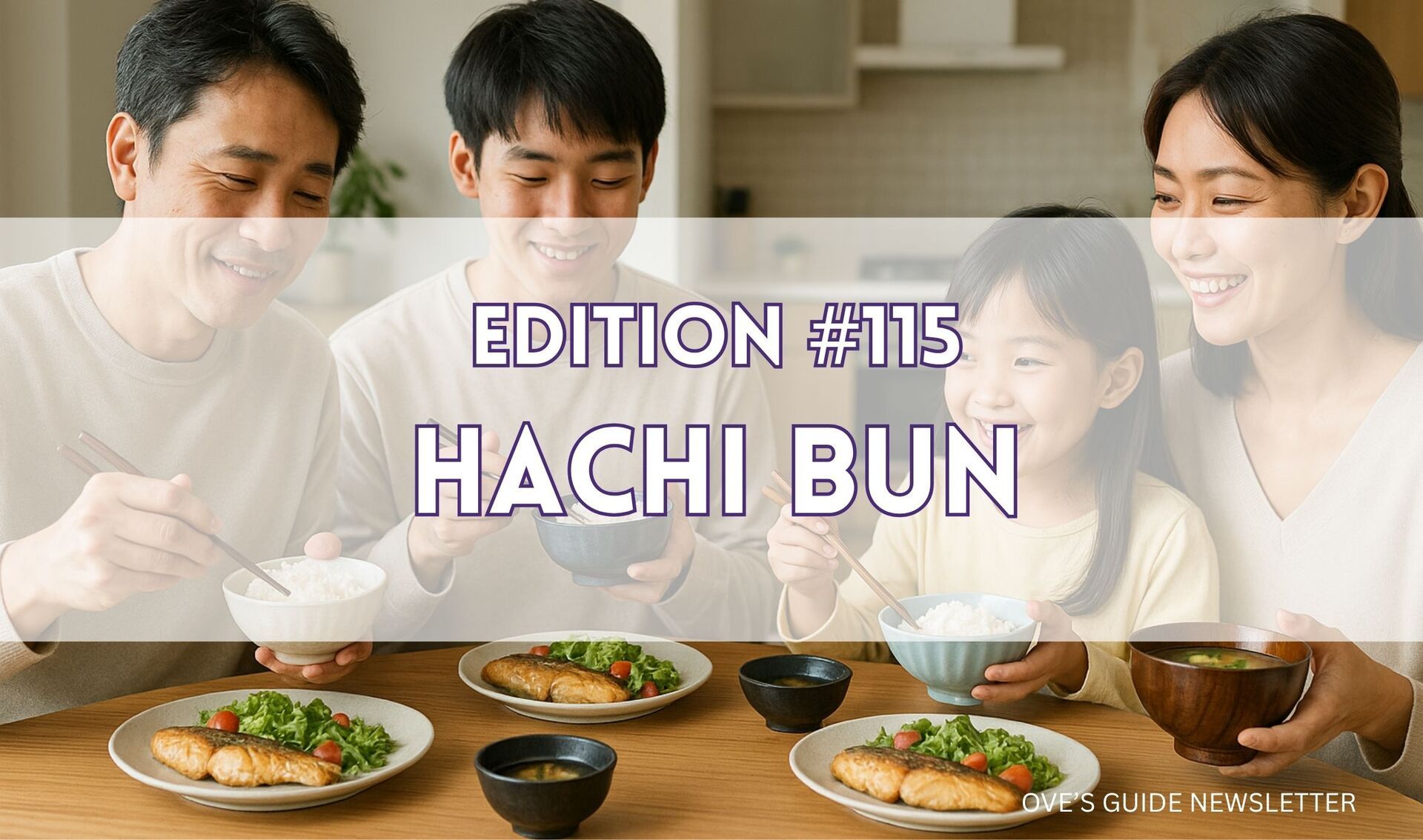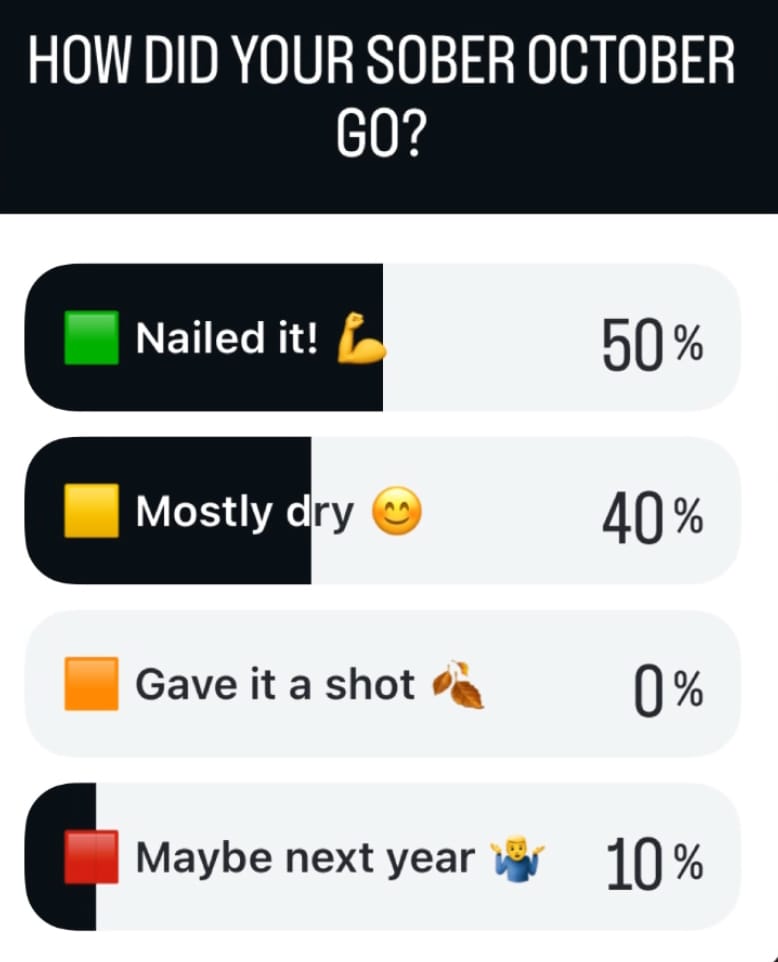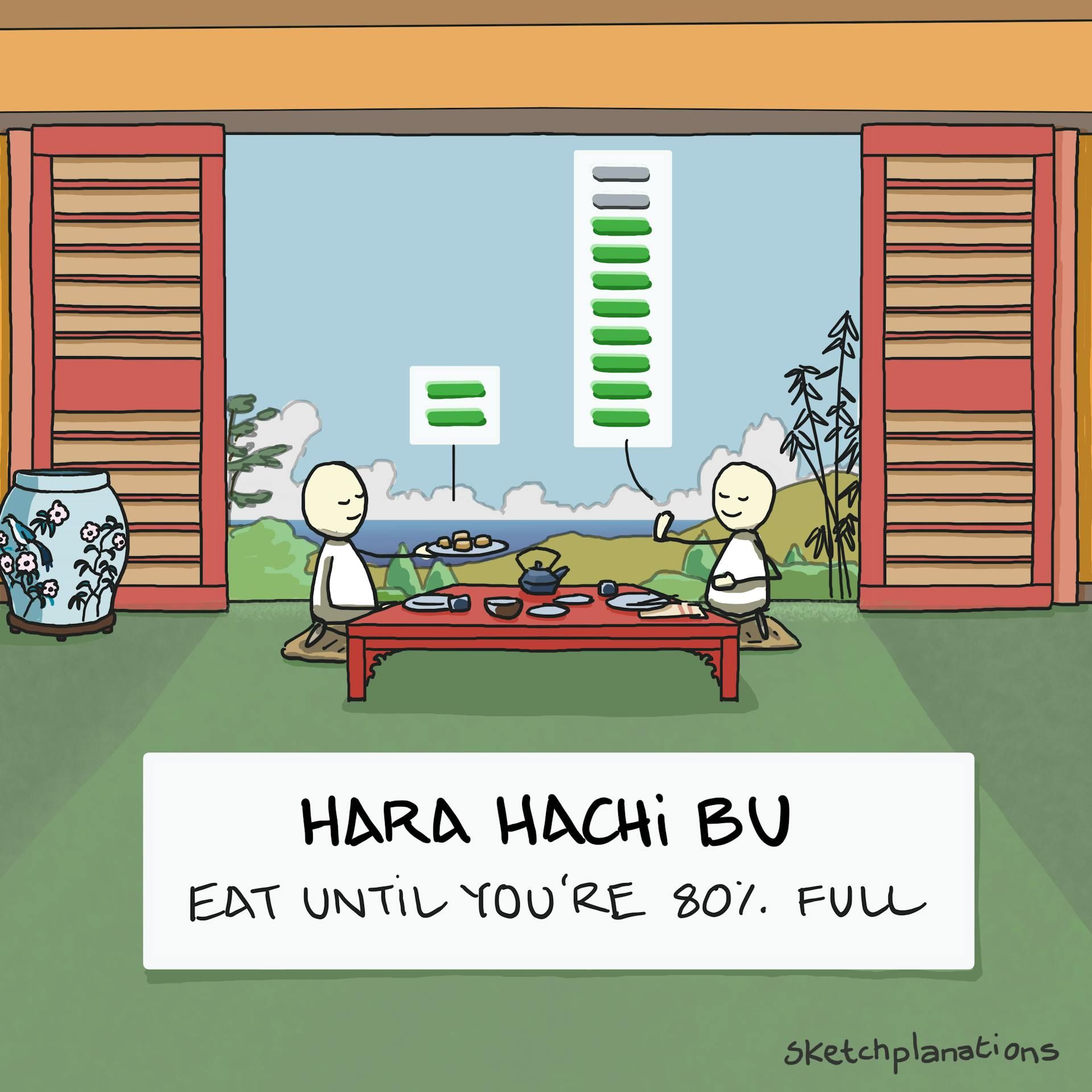Hello {{ First Name | Viewer }},
One of my favourite memories of Japan was meeting up with colleagues and gym mates at a small restaurant, sharing stories and dishes. A rainbow of perfectly portioned plates — a fine balance of protein, carbs, and fats — and the kind of camaraderie that lingers long after the meal. Under each dish lies a principle that translates to “eight parts per stomach.” Hara Hachi Bun Me.
In edition #115, we add Hachi Bun to each meal.

👇 CHECK IT OUT
👏 Support: Thank You for Supporting the Newsletter (Click The Ads 🙏)!
🍽️ Challenge: For the next 3 days, practice eating until 80% full.
💪 Exclusive Offer: Get WINTER Fit ❄️—work with Coach DC
LAST WEEK’S 📊

Congratulations again to everyone who crushed Sober October. Some have rolled right into Dry November, in preparation for the holiday season—which is usually hard on your liver.
THIS WEEK’S 🧐
Do you usually stop eating when you feel 80% full? 😋
👁️ OVE’S GUIDE TO
HARA HACHI BUN ME
🍱 What Is Hara Hachi Bun Me?
In Japan, there’s a timeless phrase: Hara Hachi Bun Me (腹八分目) — which literally means “Eat until you’re 80% full.”
It’s not a diet, but a way of living — a form of nutritional mindfulness practiced for centuries by the long-living people of Okinawa, one of the world’s five Blue Zones. The Okinawans are famous for their vitality, clarity, and calm energy — and this single phrase plays a powerful role in how they stay lean, focused, and disease-free well into their 90s and beyond.
At its core, Hara Hachi Bun Me teaches restraint without restriction — a gentle reminder that enough is often plenty.

🧘♂️ The Philosophy
“Hara” (腹) means stomach.
“Hachi” (八) means eight.
“Bun” (分) means portion.
“Me” (目) means degree or point.
Together: “Stomach 8 parts full.”
The idea is simple — stop eating when you feel about 80% satisfied, before you reach the heavy, sluggish fullness we often mistake for satisfaction. ☹️
Why? Because your brain takes about 15 to 20 minutes ⏰ to register satiety. By pausing early, you let your body catch up — preventing overeating naturally.
This is not about calorie counting or control — it’s about awareness.
🧠 The Science Behind It
Modern research aligns perfectly with this ancient wisdom.
Eating until 80% full can:
✅ Reduce overall calorie intake by 10–20% without feeling deprived.
✅ Improve insulin sensitivity and stabilize blood sugar.
✅ Lower oxidative stress and inflammation.
✅ Support gut health by easing the digestive load.
In fact, many Okinawans who follow this principle have some of the lowest rates of heart disease, obesity, and dementia in the world.
Their meals are mostly plant-based — rich in tofu, vegetables, sweet potatoes, and green tea — but their mindful paceand portion control are what truly set them apart.
🌿 Why Care?
Because longevity isn’t built on supplements or superfoods — it’s built on habits. Practicing Hara Hachi Bun Me can:
👍 Enhance energy and focus throughout the day.
👍 Strengthen metabolic health and digestion.
👍 Reinforce discipline and emotional balance.
It’s a principle of moderation, gratitude, and awareness — 3️⃣ things the modern wellness world often overlooks.
🕊️ Try This
Next meal, try this:
Before you begin, take a deep breath. As you eat, notice your body — your pace, your sensations, your fullness. When you feel satisfied but not stuffed, put your fork down. Smile. You’ve just practiced Hara Hachi Bun Me — the Okinawan secret to living light, living long, and living well.
🍽️ Challenge: For the next 3 days, practice eating until 80% full.
🕰️ Reminder: It takes 20 minutes for fullness to register.
📓 Reflection: Journal how your body and mood feel after each meal.

🌸 Final Thought
Longevity begins not in the gym or lab — but at the table.
As the Okinawans say:
“腹八分目に医者いらず”
“Eight parts full keeps the doctor away.”
🎧 MINDFUL PRACTICE
FULLNESS CHECK
💪 Try it With Your Next Meal
Here’s how you can apply Hara Hachi Bun Me in your daily routine:
1️⃣ Serve smaller portions. Use smaller plates or bowls to visually cue moderation.
2️⃣ Eat slowly. Chew thoroughly. Savour texture and taste.
3️⃣ Pause mid-meal. Ask: “Am I still hungry — or just eating out of habit?”
4️⃣ Finish with gratitude. Reflect on nourishment, not quantity.
💭 Mindful cue: When you feel 80% full, take a breath, sip some water, and stop. If hunger returns 20 minutes later, honour it — but often, it won’t.
This practice trains your body to listen and your mind to appreciate — an antidote to today’s fast, distracted eating culture.
Proudly presented by Train With Overman 👁️

You’re why I spend hours researching and crafting these editions so you can read more OVE’s Guide and eat healthier to live longer.
Until Next Edition,
Coach DC
OVE’S GUIDE 👁️
How would you rate this week's newsletter?
The information in this newsletter is for informational purposes only and may not be appropriate or applicable based on your circumstances. Overman Perspective Inc. does not provide medical or licensed advice. Please get in touch with your healthcare professional for medical advice specific to your health needs.
